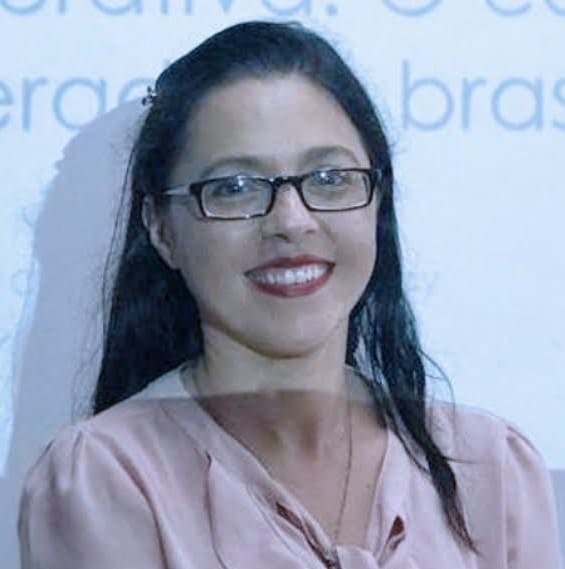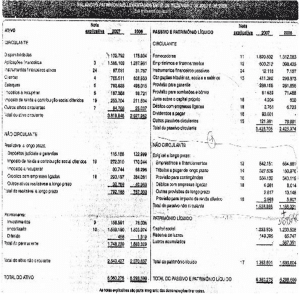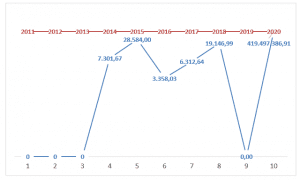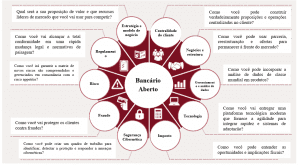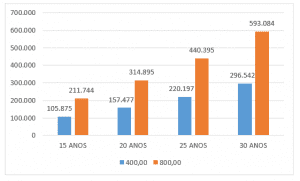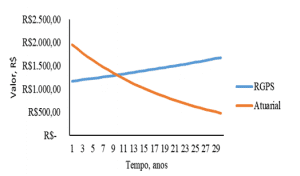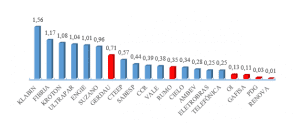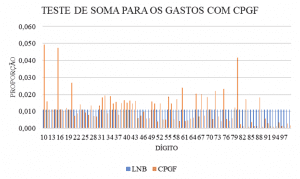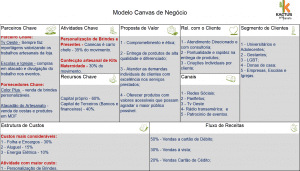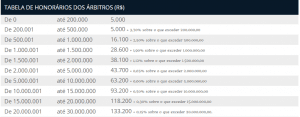ORIGINAL ARTICLE
BOMBARDELLI, Joel [1], MATOS, Gleimiria Batista da Costa [2], ARENAS, Marlene Valério dos Santos [3], BRAGA, Iluska Lobo [4], ALMEIDA, Vanessa Fernanda Rios de [5]
BOMBARDELLI, Joel. Et al. Citizenship in the discourse of the Curricular Guidelines of the Accounting Sciences course. Revista Científica Multidisciplinar Núcleo do Conhecimento. Year 05, Ed. 06, Vol. 04, p. 36-50. June 2020. ISSN: 2448-0959, Access link: https://www.nucleodoconhecimento.com.br/accounting/citizenship-in-the-discourse
ABSTRACT
Citizenship works as a discursive practice, when inscribed in the contemporary neoliberal capitalism model of education, it produces an effect of meanings in the symmetry of the education/work/citizenship trilogy, questioning the accountant subject. The citizenship of accounting sciences slips into a business or corporate citizenship that (re)produces a homogeneous and hegemonic political and social discourse. Thus, the question arises: In the Curriculum Guidelines for the Undergraduate Course in Accounting Sciences (DCCC) that guide the pedagogical proposals of Accounting Sciences Courses in Brazil, is the issue of citizenship in education/work present? How does the discursivity of citizenship work? The objective is to analyze the discursive functioning of the issue of citizenship presented in the DCCC that guide the pedagogical proposals of the Accounting Sciences Courses in Brazil. The methodology is based on the theoretical-methodological perspective of Discourse Analysis affiliation to Pêcheux and Eni Orlandi, it can be characterized in terms of objectives as explanatory, with a documental research design based on DCCC and qualitative data treatment and analysis. The results of this analysis demonstrate that the accounting professional experiences a conflict between being a citizen and being a professional according to the DCCC. The utterance “citizenship” is part of a constellation of utterances: produced by speeches from governments and business speeches, this utterance becomes edifying, functioning as if it were dignity, pride, success or even empowerment.
Keywords: Accounting Sciences, Discourse analysis, Citizenship.
INTRODUCTION
In this work, we propose to analyze the effects of meaning arising from the functioning of citizenship in the training discourse formulated in the National Curricular Guidelines for the Undergraduate Course in Accounting Sciences (DCCC), baccalaureate, issued by the Higher Education Chamber of the National Council of Education, according to Resolution CNE/CES[6] 10 of December 16, 2004.
These DCCCs were implemented by proposing pedagogical projects based on neoliberal political and social premises, already socially consolidated, which support a discourse of empowerment through competences and skills, as a way of linking society and knowledge, on the one hand, and, on the other hand, of silencing other discourses that work on “formation”, which Orlandi (2014) points out as more robust and indicative of another political structure and another social formation.
Rocha (2017) states that neoliberal policies began to become hegemonic internationally between the 1980s and 1990s, and consequently in Brazil, a time when institutions, business organizations, foundations and governments developed and disseminated a pro-market discourse. It is understood that this discourse of promoting neoliberalism was consciously and/or unconsciously carried out and producing an effect of meanings in society, as the only possible and imaginary solution to the economic and social problems of individuals. A group of intellectuals, activists and entrepreneurs previously engaged, also financed these actions of diffusion of the social neoliberal mode, mainly in the academic space, influencing future generations.
Os professores e estudantes universitários eram beneficiados pela disponibilização de livros liberais para venda ou consulta, seminários, bolsas e programas de intercâmbio financiados por organizações e universidades estrangeiras, e concursos e monografias. E, finalmente, os empresários poderiam ter acesso à participação em uma rede de contatos com empresários importantes do país fomentadas não apenas pelos Institutos Liberais, mas também pelo IEE, cujo foco era justamente a formações de jovens empresários na doutrina liberal (ROCHA, 2017, p. 5).
Before the neoliberal discourse, it is worth remembering that the higher study in Accounting Sciences in Brazil, which, from the Monarchy until the mid-twentieth century, was represented as an object of bourgeois domination, transforming itself, in contemporary times, into a market product destined to a mass public, object of consumption of other social classes. Therefore, maintaining the asymmetry of social classes.
The job market and the institutions that equip the State question the quality of the training of future accountants, or rather, the training of these professionals for the market, however they feed this very system. This questioning is based on a business and media discourse that circulates and disseminates a sense of responsibility and guilt of the subject unable to work and consequently transforms continuing education into a commodity.
The future accountant is understood in relation to the issue of training in the DCCC proposal, as a “modern” subject, free and submissive at the same time. The accountant’s professional training aims at building a symptom of individual freedom, which can be manifested by his motivation, leadership and by his free entrepreneurial initiative to undertake as a result of the exercise of his will. At the same time, he submits himself professionally to the exclusive issues of the market by positioning himself in search of the competencies and skills described in the guidelines, inscribing himself in the neoliberal capitalist social condition, in which, however, he already finds himself, in the mode of existence, as described by Deleuze (1992) in which the snake rings are even more complex.
Evidence of training and professionalization seems to be constitutive of public education policies, especially higher education in Brazil. The issue of professional profile has been expressed in Brazilian higher education since its institution, in 1808, with the arrival of the Portuguese Royal Family, when there was the creation of a higher education course in the area of health. And so, in the following years, with the foundation of the Engineering, Agriculture, Painting and Sculpture, and Law courses (SAMPAIO, 1991). For Sampaio (1991) and Cunha (2007), in these courses, the nature of technical specializations prevailed, which contributed, on the one hand, to the production of bureaucrats for the State, and, on the other hand, of liberal professionals for the market. Accounting although science fits into these technical and market liberal issues.
In this way, it would be possible to consider another wording for Resolution CNE/CES No. 10 of 2004, taken here as an instrument of subjectivation, and which could signify the notion of social formation. This notion, for Orlandi (2014), differs from the formation of society, in another discursive formation, because, in the social formation, these subject-positions constitute a continuous movement of identification processes, with knowledge and knowledge The formulation of the DCCC statements was based on the training of skills and abilities according to articles 3 and 4, described as follows:
Artigo 3º O Curso de graduação em Ciências Contábeis deve ensejar condições para que o futuro contador seja capacitado a […]
Artigo 4º O curso de graduação em Ciências Contábeis deve possibilitar formação profissional que revele, pelo menos, as seguintes competências e habilidades […]” (BRASIL, 2004, grifos nossos).
Proposing new statements, these in Orlandi’s (2014) conception of training as a foundation of knowledge, could produce other effects of meaning for accounting education, with accountants occupying other places in social formation. In this proposal, it is proposed to metaphorically formulate a new wording for articles 3 and 4:
Artigo 3º O curso de graduação em Ciências Contábeis deve ensejar condições para que o futuro contador seja formado para[…]; e,
Artigo 4º O curso de graduação em Ciências Contábeis deve possibilitar formação profissional que revele, pelo menos, os seguintes conhecimentos/saberes/experiências[…].
For the new economic order, education is a matter of economic development, of access to work through training, as a trainer training, the individual, through the social imaginary, is affiliated with the logical-rational formula of training, according to which one should study for work. And, consequently, this logic is founded as if it were the only rule capable of making the individual emerge socially and economically, and, as a result, constituting him with his full rights.
These rights frame the right to consumption and citizenship. For Orlandi (2014) there is a combination of consumption and citizenship, since skilled workers occupying the position of consumers and citizens at the same time feed the process of the skilled labor market. As skilled workers are also meant as citizens.
The question is: In the Curriculum Guidelines for the Undergraduate Course in Accounting Sciences, which guide the pedagogical proposals of Accounting Sciences Courses in Brazil, is the issue of citizenship in education/work present? How does the discursivity of citizenship work?
These questions will be dealt with in the process of discursive analysis, with the theoretical support of the French Discourse Analysis by Pêcheux and Orlandi, which articulates the linguistic with the social (constitutive of discourse) and the historical.
This article sought to understand the functioning of a discursive practice, inscribed in the model of contemporary neoliberal capitalism of education that produces meaning effects in the symmetry of the education/work/citizenship trilogy. In addition to this introduction, the article is structured considering the discursivity of citizenship and its effect of possible meanings between speakers and discourse as a social practice.
DEVELOPMENT
The discursivity of the propositions of the DCCC could not be indifferent as to not put the question of citizenship in relation to that of accounting, as it works through the memory of the legal order of education. The capabilities described in the DCCC are built by the ideological interpellation of the contemporary capitalist subject (future accountant), the subject of right and duty, who is affiliated – by the stabilized logic of accounting and by the search for a metalanguage that could transmit a truth – to certain networks of meaning in/of discursive memory.
The utterance “citizenship” (alone or in a syntactic sequence) emerges into a network of implicit – heterogeneous relationships that function under different discursive registers, with variable logical stability, and which, as Pêcheux (2006) puts it, on the functioning of the utterance it is deeply opaque. As a political discursivity, and of capitalist performance, citizenship, Brazilian or of the DCCC can function in similarity with the statement “On a gagné” [“We won”] pronounced by the French in commemoration of François Mitterrand’s victory in 1981. We won” and “citizenship”, taken as a discursive object, is immersed in allusions to “explain and describe montages, socio-historical arrangements of the constellation of statements” (PÊCHEUX, 2006, p. 60). The statement “citizenship”, following Orlandi’s reasoning (2012, p. 123), is part of a constellation of statements: produced by government and business speeches, this statement becomes edifying, functioning as if it were dignity, pride, success or even training.
Thus, Resolution CNE/CES 10/2004, in its item VI of article 4, provides for the formulation of accounting competencies and skills, relating the accountant to a way in which he must responsibly perform the accounting functions, designated, by the accounting information by him produced to others (economic agents and administrators), the construction of values oriented towards citizenship, as if the accounting information were already bearers of citizenship.
It is understood that the DCCC instrument poses the issue of citizenship as an accessory of accounting information, but this understanding may be linked to a unison accounting discursivity that makes accounting information slide towards social control, transparency, accountability and inspection of resources (especially public resources), and, consequently, of citizenship. In other words, the sense of citizenship is determined by organizational performances, being (re)signified by education, work and consumption. Paradoxically, the accountant, due to the “minimal” training, appropriates the education/work/consumption trilogy that makes him a citizen.
The future accountant is trained, finishes the course and becomes a citizen; and then, as a citizen, you will be able to build values for citizenship. Training for the future responsible accountant and citizen is presented in the DCCC, in item VI of article 4 of Resolution CNE/CES 10/2004:
VI – exercer suas responsabilidades com o expressivo domínio das funções contábeis, incluído noções de atividades atuariais e de quantificações de informações financeiras, patrimoniais e governamentais, que viabilizem os agentes econômicos e aos administradores de qualquer segmento produtivo ou institucional o pleno cumprimento de seus encargos quanto ao gerenciamento, aos controles e à prestação de contas de sua gestão perante à sociedade, gerando também informações para a tomada de decisão, organização de atitudes e construção de valores orientados para a cidadania. (BRASIL, 2004, grifo nosso)
The organization of the statement “construction of values oriented towards citizenship”, seems to work producing the effect that the entire production of the accountant’s activity would be directed or aimed at citizenship (its production, its promotion, its guarantee, etc.). Due to their responsibility to perform the accounting function, the accountant would have to organize attitudes and build values oriented towards citizenship, for the users of accounting information. The accounting and actuarial notions would lead to the production of complete information, which would allow it to be used by economic and social agents, so that they could make decisions also coherently guided by the values of citizenship. The accountant, in this perspective, has responsibility and commitment to/for citizenship.
It is noteworthy that, in this discursive space of accounting sciences, citizenship can be considered discursively constituted by a wooden language, which in the times of contemporary neoliberal capitalism, restricts the resonance of its meaning, dispersing it with the wind. This dispersion works in the discourse of entities, governments and educational institutions: the DCCC, although they seem to be merely technical information, are quick to disseminate the concepts of neoliberal capitalist domination, under a plot of change, of the need for the “adequacy” of society to the times of modernity.
In Brazilian historicity, the relationship between the constitution of our language and its articulation in the discursivity of citizenship, according to Orlandi (2013), is conceived not in relation to juridical-political law, but by the belief in the possibility of transformation through education, disguised in the form of professional qualification, of training, to which the Brazilian social subject must submit. In Brazil, independent for almost two centuries, with a century functioning as a republic, Orlandi (2013, p. 257) points out:
[…] não se nasce cidadão. Não se trata assim de uma questão jurídico-política. As leis são uma projeção de um desejo. Essa tarefa – de transformação e não de direito: “virar cidadão” – fica para a educação, ou seja, é uma questão pedagógica que pode ou não atingir o sujeito social brasileiro. (ORLANDI, 2013, p. 257)
In this conception of Orlandi (2013), we have the State and neoliberalism functioning in education and meaning citizenship. So that education says who (not) is a citizen, that is, who can be a citizen in Brazilian society. The school for education transforms the subject into a citizen, distinguishing him from the one for whom citizenship does not mean (in the same way). There is, then, the training of the future professional by the higher course in accounting sciences: an accountant who must “graduate”, also, necessarily, as a citizen who cares for another for the information, and erasing the knowledge, Information is not the same as “knowledge”.
The citizenship of the DCCC also refers us to the discursive memory, through the “wooden language”, of the sayings made available in the education laws, (re)produced in other previous documents, such as the Brazilian Constitution of 1988 and the Law of Directives and Base of Education 1996, textualities that articulate the meaning of citizenship in DCCC.
The Federal Constitution of 1988 works (re)signifying the previous constitutions, presents as one of the fundamental principles of the Democratic State of Law, “citizenship”, the term is written loose, one, without complement, according to article 1: “[…] constitutes a Democratic State of Law and is based on: I – sovereignty; II – citizenship; III – the dignity of the human person; IV – the social values of work and free enterprise; V – political pluralism” (emphasis added).
Still in the text of the 1988 Constitution, citizenship is presented in the Chapter on Education of Culture and Sport, in which the articulation between education and qualification for work is formulated: in this relationship a trilogy is forged, that is, education/work /citizenship. The transcript of article 205 of the Federal Constitution of 1988(17) reproduces a statement with this trilogy: “education, a right of all and a duty of the State and the family, will be promoted and encouraged with the collaboration of society, aiming at the full development of person, their preparation for the exercise of citizenship and their qualification for work” (emphasis added).
This education/work/citizenship trilogy, in continuity, is organized and takes shape by the Law of Directives and Base of Education of 1996, which presents citizenship in the text described as principles and purposes of national education, related to education as a preparation for the exercise of citizenship. Thus, we find in art. 2: “Education, a duty of the family and the State, inspired by the principles of freedom and the ideals of human solidarity, aims at the full development of the student, his preparation for the exercise of citizenship and his qualification for work”.
The discursive process that means the texts of the Brazilian Constitution and the Law of Directives and Base of Education establishes the symbolic conditions that support the political-legal-administrative character of the DCCC for the Undergraduate Course in Accounting Sciences, in which “citizenship” is formulated as an object of values to be constructed and/or inserted by the information generated by accounting, that is, citizenship as if it were included, inserted in the accounting information produced by the accountants so that third parties, the users of the information, in the decision-making process could reveal citizenship. A citizenship through information. Accounting information without citizenship means decision without citizenship.
The conception of the political-administrative discourse of our education legislation, supported by the coercive support of the juridical over the subjects, even if the juridical one wants to guarantee individual or collective rights, establishes that the sense of citizenship is stabilized in the effects of evidence of education and of job. And work slips symmetrically towards the production of wealth.
And, through the education/work/citizenship trilogy, the imaginary of the conditions of existence of the subject and society works. The educated subject is a skilled worker, free, entrepreneur, entrepreneur of himself. However, being an educated citizen working does not mean citizenship. Public education policies work by dividing the social, intensifying asymmetries and inequalities, producing a certain slippage that associates education with discrimination. The non-citizen is already discriminated against, he is a subject without the ability of skills and competences capable of “producing values” for citizenship, because the worker, entrepreneur is always recognized for the lack of training.
The school, the university, the educational system as a whole, are classifiers, separators, as a sorting process that produce a social division between the capable and the incapacitated subject (ORLANDI, 2016), who has knowledge and who does not have it, approved and disapproved.
One has citizenship which means slipping into meaning effects such as employment, work and income. An enabling and non-training education. And, in the case of accounting sciences, the science of heritage, wealth, profit, etc. These terms also function in a drift towards citizenship. The subject with patrimony, wealth, income, etc, originated by profit, income or work is a complete citizen.
The discourse of education for citizenship is formulated and works like a language of wind: education is almost exclusively aimed at work/income/profit, and from the combination of education and work, the subject “cross-dressed” as a citizen emerges. Accounting citizenship slides into corporate citizenship, corporate citizenship.
THE WORKING OF THE DISCOURSE BY/BY CITIZENSHIP OF THE NATIONAL CURRICULAR GUIDELINES FOR THE GRADUATE COURSE IN ACCOUNTING SCIENCES
The discursivity of the DCCC is materialized in the reports prepared by accounting professionals. As a first example, we can mention the case of Empresa Natura, a cosmetics industry that uses forest essences from the Amazon as one of its raw materials.
In its Annual Report[7] for 2004, it highlights an award report obtained by Natura, referring to the “Good Corporate Citizenship Guide”, under the title “How to share values – Natura’s strategy is to convince its partners to bet on social responsibility”.
The strategy with its raw material suppliers in the State of Amapá, which are the producers (riverside peoples, rubber tappers, nut producers and Indians), aiming at the sustainability of the business, consists of partnering with the Ministry of Education to encourage the return to the producers’ classroom. This solution would have motivated Natura’s salespeople (consultants) to be more dedicated in selling the company’s products, as it is a solution linked to “social causes”, leading to the belief that the consultants even wanted to participate actively and directly in the aforementioned business project.
Both Natura’s producers and consultants, and the accountants who prepare the reports, are challenged by neoliberal capitalism. In this sense, Orlandi and Lagazzi-Rodrigues (2015, p. 23-24) state:
o sujeito moderno e ao mesmo tempo livre e submisso, determinado pela exterioridade e determinador do que diz: essa é a condição de sua responsabilidade (sujeito jurídico, sujeito a direitos e deveres) e de sua coerência (não contradição) que lhe garantem, em conjunto, sua impressão de unidade e controle de sua vontade, não só dos outros, mas até de si mesmo, bastando para isso ter poder e consciência. Essa é ilusão.
Business and accounting discourse is a homogeneous and hegemonic discourse, which replaces “profit” with others, we have more social words, even less capitalist ones, as evidence of the functioning of neoliberal capitalism, by the supposedly positive visibility of a certain type of citizenship.
One of these discourses formulates the “social causes” of private companies, which even produce media strategies to demonstrate to society the commitment of companies to such causes, as if companies were participants or articulators/executors of public policies, however, they are nothing more than a ruse behavior with its consumers and collaborators, whose only objective is to expand its consumer market and profit.
In the financial market, we have the case of the accounting part of the Management Report of the Consolidated Balance Sheet of Banco Itaú[8], for the year 2015, also prepared by accountants/managers: it presents Fundação Itaú Social as a promoter of the bank’s actions in education and health. The Foundation focuses on the development, implementation and dissemination of social technologies aimed at the progress of public education policies, to enhance the engagement of its employees. However, these public policies are focused on training and not on training future generations.
Critical training is excluded in the training process. These balance sheets, texts that Fairclough (2001) understands to be of the information-and-advertising or talk-and-sell type, such as the Socio-environmental Balance, the Management Reports, the Financial Statements, have become usual in various orders of institutional discourses in contemporary society. They combine regulated financial information with advertising aimed at sale and consumption, and they also benefit from certain tax incentives that reduce tax payments to the State.
In other words, it can be understood as advertising by private entities financed with public money. These texts witness “a colonizing movement of advertising from the domain of the consumer goods market, in a strict sense, to a variety of other domains” (FAIRCLOUGH, 2001, p. 151). The DCCC discursivity takes shape in these institutional texts produced by the accountant trained in the neoliberal model of higher education.
Another example of institutional discursive articulation is the one presented in the Financial Statements of JBS[9], in fiscal year 2012, which shows the business group as one of the largest producers of animal proteins in the world and with supposed commitments to social responsibility, through activities developed by its Germinare Institute.
The Institute’s objective is educational: it proposes “to offer excellent elementary and secondary education free of charge, forming well-prepared citizens from an academic and human point of view, with a broad cultural repertoire, consolidated ethical values and positive attitudes towards life and society”. However, the “ethical, human or positive social attitudes” values do not seem to be the organization’s strength, as it actively participated in a scenario[10] of whistleblowing, investigations and corruption.
FINAL CONSIDERATIONS
As a conclusion, we understand that the relationship between accounting sciences and citizenship constitutes a meaningful social space, built by the institutional discourse that produces, as an effect, the commodification of education, linking it to work and consumption. That is, the accountant, in the responsible exercise of his attributions, produces accounting information regarding the performance and results of organizations, which can produce a metaphorical effect that can be interpreted as: by the minimum qualification of accounting education.
The accountant subject becomes minimally bourgeois or an instrument to (re)produce the neoliberal capitalist system. It contributes to the concentration and centralization of capital, producing a citizenship discourse already inserted in the capitalist/neoliberal model articulated in the education/work/citizenship trilogy.
The National Curriculum Guidelines for the Undergraduate Course in Accounting Sciences provide for Discourse Analysis a space for language and historicity, in a state-legal and business discourse, with a scientific avatar, subordinated to the dominant political discourse, which conditions the saying and the conditions of production of this saying about citizenship and education.
The state-legal-business discourse, even wanting to function as a logical and stabilized discursive space as a royal science, is flawed and incomplete. Accounting citizenship as proposed in the DCCC produces an increase in asymmetries between social classes, since corporate citizenship exists due to the condition of despoiling the worker, that is, the corporations themselves produce inequalities and then in another discourse they say they want to repair the already ( re)produced.
The edifying statement of citizenship is affiliated to a moralistic, neoliberal discourse and to the winds of the contemporary world, which propagate in society in a dissimulated way, as if they were transparent, without opacity. The subject becomes an accountant through training, and, as a result, becomes a citizen, being covertly inscribed in the capitalist’s memory of a corporate citizenship designed by the functioning of the legal-administrative discourse at the service of neoliberalism’s way of producing.
In the space of companies, businesses, subjects find a situation of becoming aware, even if unconscious of the place assigned to them, of their social class. In this way, words gain meaning from the positions in which they are used, from the discursive formations in which words acquire their possible meanings. Corporate citizenship, as the language of business, works in the social imagination as a way of distributing profits, however its organic functioning is in symmetry with the generation of profits.
However, accounting must be understood as a process of production of meanings, and the “accounting language”, in turn, also works through the prism that a meaning always slides/derives to another meaning, subject and meaning are constituted at the same time. In this direction, it can be said, for example, that the sense of citizenship has an open meaning effect, meaning differently, on the one hand, for those who work, on the other hand, for those who do not have a job.
The resistance of citizen accountants to the Deleuzian snake rings can emerge from a conception of education, whether basic or higher, but an education that does not exclusively provide work, but creates space for criticism and for social changes and alterations.
Shifting the concept of training to a concept of training the academic of accounting sciences, that is, privileging knowledge/knowledge can provide the accountant with a position to discern and/or recognize a different social training practice, which establishes it as a possibility the inscription in a citizenship memory other than the corporate one. The discourse of/for citizenship is not closed, it has no beginning and no end, even in the pragmatism of accounting sciences.
REFERENCES
BRASIL. Constituição da República Federativa do Brasil: promulgada em 5 de outubro de 1988. Brasília, DF: Senado Federal.. Disponível: https://www.planalto.gov.br/ccivil_03/constituicao/ConstituicaoCompilado.htm. Acesso em novembro/2019
BRASIL. Ministério da Educação. Conselho Nacional de Educação. Câmara de Educação Superior. Resolução CNE/CES 10, de 16 de dezembro de 2004.
BRASIL. Ministério da Educação. Lei de Diretrizes e Bases da Educação Nacional. Lei n. 9.394/96. Disponível em: http://www.planalto.gov.br/ccivil_03/Leis/L9394.htm. Acesso em novembro de 2019.
CUNHA, Luiz Antônio. A universidade temporã: o ensino superior, da colônia à era Vargas. 3ª. ed. São Paulo: Editora UNESP, 2007.
DELEUZE, G. Post-scriptum sobre as sociedades de controles, L’autre Journal. n. 1, maio1990. [Trad. Bras. em Conversações, 1972-1990. Rio de Janeiro: Ed. 34, 1992]. Disponível em http://www.portalgens.com.br/filosofia/textos/sociedades_de_controle_deleuze.pdf. Acesso em novembro de 2016.]
FAIRCLOUGH, Norman. Discurso e mudança social. Trad. Bras. Brasília: Editora da Universidade de Brasília. 2001.
GADET, Françoise; PÊCHEUX, Michel. A língua inatingível. O discurso na história da língua. Trad. Bras. 2ª ed. Campinas: Ed. RG, 2010.
HERBERT, Thomas. Reflexões sobrea situação teórica das ciências sociais e, especialmente, psicologia social. Analise de Discurso: Michel Pêcheux. Textos escolhidos por: Eni Puccinelli Orlandi: análise de discurso. Campinas, SP: Pontes, 2016. p. 21- 54.
ORLANDI, Eni. Palestra proferida na Univás, no dia 25 de agosto de 2016
ORLANDI, Eni. Análise de Discurso: princípios e procedimentos. 12ª. ed. Campinas: Pontes, 2015.
ORLANDI, Eni. Discurso em análise: sujeito sentido e ideologia. 2ª. ed. Campinas: Pontes, 2012.
ORLANDI, Eni. Formas de conhecimento, informação e políticas públicas. Revista Animus. Santa Maria, v. 9, n. 17, 2010. Disponível em https://periodicos.ufsm.br/animus/article/view/2373/2458. Acesso outubro de 2016.
ORLANDI, Eni. Língua e conhecimento linguístico: para uma história das ideias no Brasil. 2ª ed. São Paulo: Cortez, 2013.
ORLANDI, Eni.. Formação ou capacitação? Duas formas de ligar sociedade e conhecimento. Em: FERREIRA, E.L.; ORLANDI, E.P. (Orgs.). Discursos sobre a inclusão. Niterói: Intertexto, 2014.
ORLANDI, Eni; LAGAZZI-RODRIGUES, Suzy (Orgs.). Introdução às ciências da linguagem: discurso e textualidade. Campinas: Pontes, 2015.
PÊCHEUX, M. Análise Automática do Discurso (AAD-69). Em: GADET, F.; HAK, T. (Orgs.) Por uma Análise Automática do Discurso: uma introdução à obra de Michel Pêcheux. Trad. Bras. Campinas: Unicamp, 1990.
PÊCHEUX, M. Análise de discurso – Michel Pêcheux [Textos escolhidos por Eni P. Orlandi]. Campinas: Pontes, 2011.
PÊCHEUX, M. L’étrange miroir de l’analyse de discours. In: Langages, 15ᵉ année, n°62, 1981. Analyse du discours politique. pp. 5-8. Disponível em: https://www.persee.fr/doc/lgge_0458-726x_1981_num_15_62_1872. Acesso em abril/2020
PÊCHEUX, M. O discurso: estrutura ou acontecimento. Trad. Bras. 4ª ed. Campinas: Pontes, 2006.
RANCIÈRE, Jaques. A partilha do sensível: estética e política. Trad. Bras. São Paulo: Exo experimental org.; Ed. 34, 2005.
ROCHA, Camila. Passando o bastão: a nova geração de liberais brasileiros. Nuevo Mundo Mundos Nuevos [En ligne], Colloques, mis en ligne le 02 octobre 2017, consulté le 26 avril 2020. Disponível: https://journals.openedition.org/nuevomundo/71327; DOI: https://doi.org/10.4000/nuevomundo.71327
SAMPAIO, Helena. Evolução do ensino superior brasileiro, 1808-1990. Documento de trabalho 8/91, Núcleo de Pesquisa sobre Ensino Superior Brasileiro da Universidade de São Paulo, 1991. Disponível em http://nupps.usp.br/downloads/docs/dt9108.pdf; acesso em out/2016.
APPENDIX – FOOTNOTE REFERENCES
6. Brazilian Council of Education.
7. The 2004 Natura Annual Report (Cosmetics Company) is what is usually called the Social and Environmental Balance: it has the informative character of presenting details of the company’s activities and economic-financial results to the public, being prepared according to concepts of transparency , scope and integrity, and in compliance with national and international bodies. Natura’s 2004 Annual Report is available at www.natu.infoinvest.com.br/ptb/1762/Port_Rel_Anual_2004.pdf; Accessed in December 2016.
8. The Consolidated Balance Sheet of Banco Itaú (year 2015) is available at https;//www.itau.com.br/_arquivosestaticos/RI/…/IFRS31122015_eng.pdf; Accessed in December 2016.
9. The 2012 Financial Statements of Grupo Empresarial JBS are available at: www.jbss.infoinvest.com.br/enu/…/DF%20311212_português_complete_final.pdf. Accessed in December 2016.
10. In June 2017, the majority partners of the JBS business group made a plea bargain on the purchase of business privileges from politicians and public entities. Audios/videos recorded with authorities were presented, indicating dialogues about paying bribes, carrying a suitcase of money, etc.
[1] PhD in Language Sciences (UNIVÁS). Master in Production Engineering (UFSC). Graduated in Accounting Sciences (UNIR).
[2] PhD in Regional Development.
[3] PhD in Business Administration from UFRS.
[4] PhD in Business Administration from UNIGRANRIO.
[5] Master in Administration.
Sent: May, 2020.
Approved: June, 2020.
